- Make It Yourself Lavender Heart-Shaped Bath Bombs!
- 20 Things You Never Knew About “Down There”
- 12 Best Foods For Those Suffering From Arthritis Pain
- 12 Personal Hygiene Mistakes Almost Everyone Makes (Mom Never Told You About #4!)
- 15 Medicinal Plants And Herbs From The Cherokee People
- 12 Mind-Blowing Benefits Of Drinking Coconut Water During Pregnancy
- 12 Outstanding Winter Foods That Won’t Fatten You Up Like A Christmas Turkey
12 High Fat Foods That Are Surprisingly Healthy

Photo credit: bigstock.com
All it takes is one walk around your local supermarket, and you will see low fat everything. Low fat chips, low fat dairy products, low fat cheese, low fat cookies, just about every processed food proudly states that it is “low fat.” But is this really good thing?
Fat has been demonized for the last 60 years, at least, being touted as the root cause of obesity, heart disease, cancer, and just about every other illness known to man. So, Americans have been on a low fat craze for years now — and guess what? We are fatter and sicker than ever! How can this be?
If only the low fat craze had been replaced with a low sugar or low carb craze. Then we would have truly seen results! The truth is that our bodies need fat, healthy fats, from Mother Nature, not the man-made trans-fats that Americans have been gobbling up (along with those “low fat” snacks) for the last 50 years.
If only Americans were to ditch their high sugar, high carb, processed food diets and go for low carb, low sugar, minimally processed foods that contain more of the healthy fats all around us.
Are you so confused about fats that when someone says “natural fats,” you immediately picture Kirstie Alley? Then keep reading! We will fill you in on some of the best natural fats that are not only really good for your body and mind, but they also taste great!
1. Flax Seeds
Just one tablespoon of ground flax seeds (which are easy to sprinkle over yogurt, salads, or soups) has just slightly more than four grams of fat. One gram of these fats is monounsaturated, and three grams are polyunsaturated. Whenever you hear the word “unsaturated,” you know you are eating the fats that are good for you. Polyunsaturated fats lower cholesterol levels in general, and monounsaturated fats increase the HDL (good) cholesterol in our bodies.
Flax seeds also contain between 75 and 800 times more lignans than just about any other type of plant. Lignans act like antioxidants in the body, killing off free radicals that cause damage on a cellular level. Flax seeds need to be ground to get the most nutrition, so if you buy fresh, whole seeds, simply pop a tablespoon or so into your spice or coffee grinder before you add them to your foods.
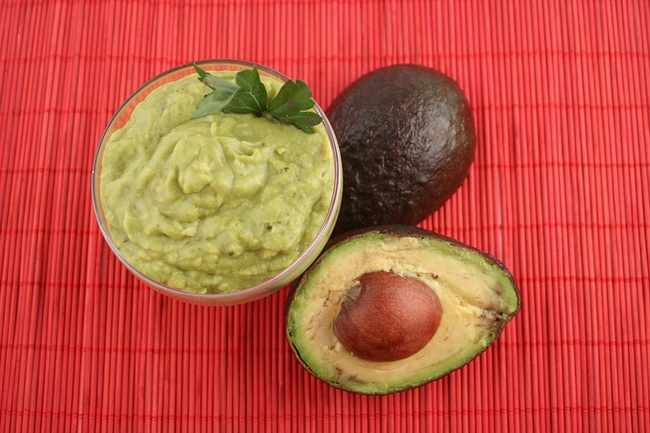
Photo credit: bigstock.com
2. Avocados
You might think avocado is a vegetable, but it is actually a fruit and, as you might imagine, it is very different from other fruits. This one doesn’t contain much sugar or many carbs, but it is loaded with healthy fats. The truth is that avocados are comprised of about 77 percent fat, a higher level what’s found in many animal products! The good news is that the type of fat this green fruit contains is oleic acid. This is a monounsaturated fat, and it’s the same type of fat found in olive oil, meaning avocadoes are loaded with healthy goodness.
Avocados are also a great source of potassium, and have 40 percent more potassium than bananas. Potassium binds with salt and removes it from the body, lowering blood pressure levels. Studies show that in addition to being a terrific source of fiber, avocados can lower your triglyceride and LDL (bad) cholesterol while improving HDL (good) cholesterol. Many people avoid avocados because of their fat content, but as the research has shown, those who eat more guacamole tend to weigh less and have smaller waistlines than those who don’t.

Photo credit: bigstock.com
3. Yogurt
We are talking about real, full-fat yogurt, not the kind made from skim or non-fat milk. Full-fat yogurt is incredibly healthy and is loaded with healthy nutrients. The main reason people eat yogurt, however, is for the probiotics it contains. Probiotics are the healthy bacteria that live naturally in your digestive system.
Eating yogurt regularly can lead to major improvements in your health including lowering your risk of heart disease, lowering your risk of obesity, improving digestive health, and strengthening your immune system. Be certain that you are choosing a full-fat yogurt without tons of added sugar. You can always add your own flavorings such as fresh fruit, nuts, or chia seeds.

Photo credit: bigstock.com
4. Chia Seeds
Speaking of chia seeds, these are another good source of healthy fats, even though most people don’t think of them this way. One ounce of chia seeds (about 28 grams) has a full nine grams of fat. When you consider that almost all the carbs in chia seeds are fiber, the majority of the calories in chia seeds come from their fat content. Chia seeds are about 80 percent fat, which makes them one of the most perfect high fat plants around.
But don’t worry — these tiny seeds have heart healthy omega-3 fats called ALA. These seeds are incredibly nutritious and have many health benefits, including lowering blood pressure levels and lowering inflammation in the body. Chia seeds also contain many trace minerals that are hard to find in other foods. Add a tablespoon or two of chia seeds to your smoothies, soup, salads, or yogurt for some super healthy fats that can do so much for your health!
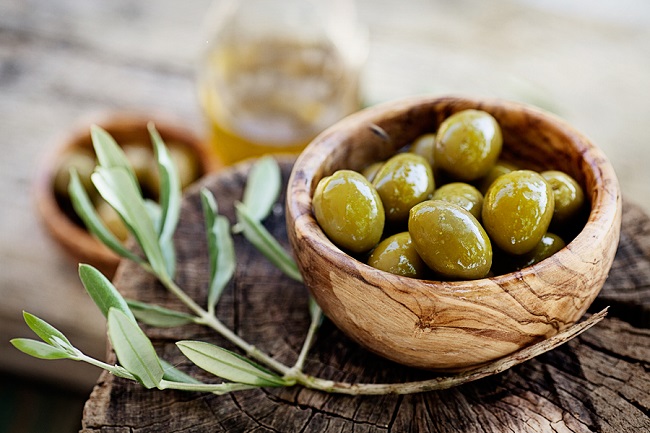
Photo credit: bigstock.com
5. Olives And Olive Oil
Love olives? Most people do! Adding just 10 large olives to your next salad will give you a healthy five grams of fat, 3.5 grams of which are the healthy monounsaturated type, and .4 of which are the healthy polyunsaturated kind. You can’t go wrong with olives because in addition to being a great source of healthy fat, these fermented treats are loaded with probiotics, which are really healthy for your digestive system and your immune system.
However, if you are not a fan of olives, there is always olive oil. Olives and extra virgin olive oil are essential parts of the healthy Mediterranean diet. Olive oil is loaded with powerful antioxidants known to fight inflammation, lower blood pressure, and reduce the risk of heart disease — just to name a few. Always buy extra virgin olive oil for maximum health benefits.

Photo credit: bigstock.com
6. Cheese
Cheese is incredibly nutritious. It is a super source of calcium, selenium, phosphorus, vitamin B12, and many other nutrients that the body needs. Cheese is also rich in protein with one thick slice of hard cheese containing almost seven grams of protein. Like other full-fat dairy products, cheese has potent fatty acids that have numerous health benefits, including reducing your risk of developing type 2 diabetes.
When we talk about cheese, we are referring to hard cheeses such as cheddar — not the junky “American” cheese slices that try to pass themselves off as being real cheese.
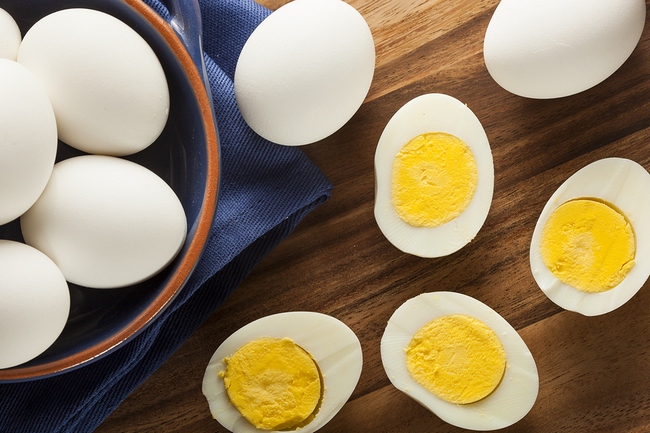
Photo credit: bigstock.com
7. Eggs
In the past, many people avoided whole eggs because they were told that they contained unhealthy levels of fat and cholesterol. Due to better technology, we now know that the cholesterol in eggs does not affect the cholesterol in the blood. Eggs are one of the most nutrient-dense foods in the world, and they have almost every single nutrient the human body needs. They have powerful antioxidants which protect the eyes; an important nutrient for the brain that most people do not get enough of called choline; and they can even help you lose weight or maintain a healthy weight.
Even though eggs are high in fat, studies show that those who replace their morning cereal with eggs end up eating fewer calories throughout the day. So don’t pitch the yolk — it’s the most nutritious part of the egg! Eat two for breakfast, and you will be giving your body a head start on some healthy fat and nutrition that it can use all day long.

Photo credit: bigstock.com
8. Nuts
These are one of the best sources of healthy fats and fiber, but many people pass on them because they feel they can’t afford the fat and calories in their diet. This is a big mistake! Studies have shown that people who eat nuts on regular basis are found to be healthier and have a lower risk of developing several types of chronic disease, including heart disease, diabetes, and obesity.
Tree nuts, such as cashews and almonds, are high in healthy fats, magnesium, and vitamin E, which acts like an antioxidant in the body, protecting you from the damage caused by free radicals. The best nuts to snack on are walnuts, almonds, cashews, and macadamia nuts. All you need is a handful, about an ounce, each day to get all the healthy benefits that nuts offer.

Photo credit: bigstock.com
9. Dark Chocolate
This is one of the rare things in nature – a commercially processed plant that is super healthy for you, even with its high fat levels. Dark chocolate has about 65 percent of its calories in its healthy fats, but it is also overflowing with healthy antioxidants — so many that it even ranks higher than blueberries! Antioxidants fight the free radicals that cause inflammation and disease, lower blood pressure levels, and prevent the LDL cholesterol in the blood from becoming oxidized.
Studies have shown that those who eat some dark chocolate at least five days each week are 50 percent less likely to die from heart disease when compared with those who don’t enjoy dark chocolate. This tasty treat improves brain function and can even protect your skin from the damaging UV rays of the sun. Choose a high quality dark chocolate with at least 70 percent cocoa. You can eat one delicious ounce of dark chocolate every single day and feel good about the health benefits you are giving your body.

Photo credit: bigstock.com
10. Fatty Fish
As the name implies, fatty fish, such as salmon, sardines, halibut, trout, and mackerel, are loaded with healthy fats! They are full of those heart-healthy omega-3 fatty acids, high quality protein, and many other important nutrients.
SEE ALSO: Top 15 Contaminated Fish You Shouldn’t be Eating
People who eat fish regularly tend to be healthier, and they have lower rates of depression, dementia, and heart disease than those who abstain from the sushi bar, according to numerous studies. If you are a land lubber who is not fond of fish, take a fish liver oil supplement, krill oil supplement, or take some cod liver oil each day to get the omega-3s your body needs, plus a healthy dose of vitamin D.
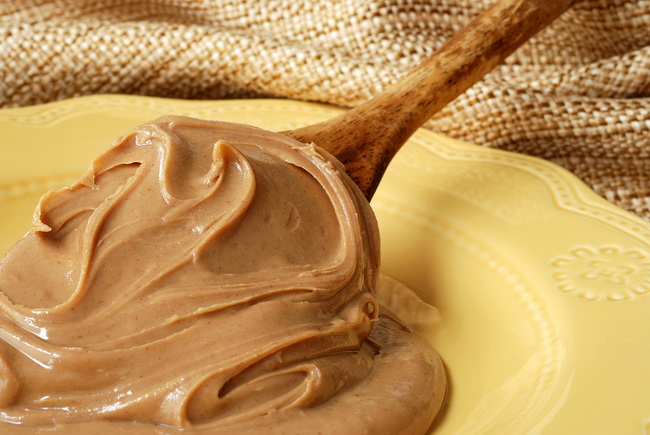
Photo credit: bigstock.com
11. Nut Butter
These are a terrific source of healthy fats, and plain old peanut butter is just the beginning. If you have never tried cashew or almond butter, you are truly missing out! No matter which type of nut you decide to use, all of these nut butters will boost your protein and fiber intake as well as being a terrific source of natural fat.
Your best choice here is to make your own at home using as few ingredients as possible. Even many “healthy “or “natural” nut butters contain unwanted amounts of salt, artificial colors, and sometimes even very unhealthy preservatives like BHA. There are tons of recipes online, including here on Naturalon!
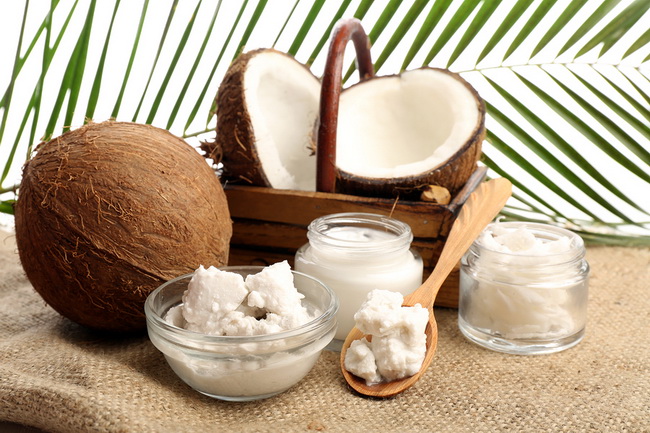
Photo credit: bigstock.com
12. Coconuts And Coconut Oil
One of the best sources of saturated fats anywhere in the world, coconuts and their oil contain about 90 percent saturated fats. You might have heard that saturated fats are not good for you, but in reasonable quantities, the exact opposite is true. What you don’t want to do is to overindulge. Like dark chocolate and nuts, a little bit (about two tablespoons each day) goes a long way when it comes to your health. Studies have shown that in some cultures, those who consumed even large amounts of coconut and coconut oil had very low levels of heart disease and were in excellent overall health.This is because the fat in coconut oil is different from most other fats and contains medium chain fatty acids, which are metabolized differently than other types of fats. Medium chain fats suppress the appetite, help people eat less, and improve the metabolism — helping people burn about an extra 120 calories every day. In fact, many recent studies show that coconut oil can help those with Alzheimer’s and help many people lose belly fat. Always choose virgin coconut oil for super healthy benefits that you can feel!
Don’t forget that one gram of fat has nine calories, so if you are consuming a diet of about 2,000 calories each day, you would want to eat between 44 and 78 grams of fat. Moderation and variety is the key to a healthy diet, so pick and choose your healthy fats and avoid overindulging.
References:
































